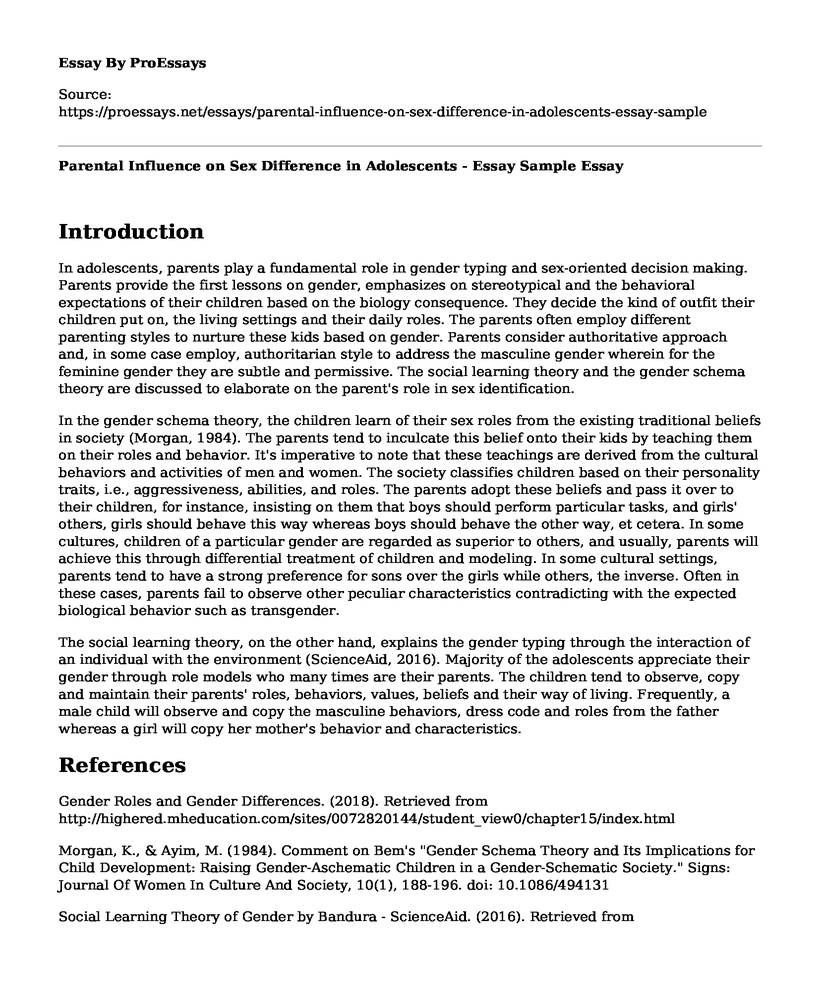Introduction
In adolescents, parents play a fundamental role in gender typing and sex-oriented decision making. Parents provide the first lessons on gender, emphasizes on stereotypical and the behavioral expectations of their children based on the biology consequence. They decide the kind of outfit their children put on, the living settings and their daily roles. The parents often employ different parenting styles to nurture these kids based on gender. Parents consider authoritative approach and, in some case employ, authoritarian style to address the masculine gender wherein for the feminine gender they are subtle and permissive. The social learning theory and the gender schema theory are discussed to elaborate on the parent's role in sex identification.
In the gender schema theory, the children learn of their sex roles from the existing traditional beliefs in society (Morgan, 1984). The parents tend to inculcate this belief onto their kids by teaching them on their roles and behavior. It's imperative to note that these teachings are derived from the cultural behaviors and activities of men and women. The society classifies children based on their personality traits, i.e., aggressiveness, abilities, and roles. The parents adopt these beliefs and pass it over to their children, for instance, insisting on them that boys should perform particular tasks, and girls' others, girls should behave this way whereas boys should behave the other way, et cetera. In some cultures, children of a particular gender are regarded as superior to others, and usually, parents will achieve this through differential treatment of children and modeling. In some cultural settings, parents tend to have a strong preference for sons over the girls while others, the inverse. Often in these cases, parents fail to observe other peculiar characteristics contradicting with the expected biological behavior such as transgender.
The social learning theory, on the other hand, explains the gender typing through the interaction of an individual with the environment (ScienceAid, 2016). Majority of the adolescents appreciate their gender through role models who many times are their parents. The children tend to observe, copy and maintain their parents' roles, behaviors, values, beliefs and their way of living. Frequently, a male child will observe and copy the masculine behaviors, dress code and roles from the father whereas a girl will copy her mother's behavior and characteristics.
References
Gender Roles and Gender Differences. (2018). Retrieved from http://highered.mheducation.com/sites/0072820144/student_view0/chapter15/index.html
Morgan, K., & Ayim, M. (1984). Comment on Bem's "Gender Schema Theory and Its Implications for Child Development: Raising Gender-Aschematic Children in a Gender-Schematic Society." Signs: Journal Of Women In Culture And Society, 10(1), 188-196. doi: 10.1086/494131
Social Learning Theory of Gender by Bandura - ScienceAid. (2016). Retrieved from https://scienceaid.net/psychology/gender/learning.html
Cite this page
Parental Influence on Sex Difference in Adolescents - Essay Sample. (2022, Dec 15). Retrieved from https://proessays.net/essays/parental-influence-on-sex-difference-in-adolescents-essay-sample
If you are the original author of this essay and no longer wish to have it published on the ProEssays website, please click below to request its removal:
- Essay Example on Are Transsexual Not Women?
- Bone of Contention on Gay Parenting Essay Example
- Teen Pregnancy Prevention Policy - Essay Sample
- Essay on Sexual Identity Crisis: Overcoming Labels in Our Society
- The Gender Binary: Presuming Alignment of Sex, Gender & Sexuality - Essay Sample
- Essay on Uprooting Discrimination: Governments Combatting Victimization of LGBT+ Individuals
- Free Essay Sample on Same-Sex Marriage in the US







